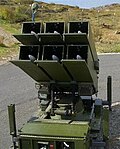 | |
| Company type | Business unit of Kongsberg Gruppen |
|---|---|
| Industry | Military |
| Founded | 1814 |
| Headquarters | Kongsberg, Norway |
Area served | Global |
Key people | Eirik Lie (President) |
| Revenue | |
Number of employees | |
| Parent | Kongsberg Gruppen |
| Website | www |
Kongsberg Defence & Aerospace (KDA) is one of three business units of Kongsberg Gruppen (KONGSBERG) of Norway and a supplier of defence and space related systems and products, mainly anti-ship missiles, military communications, and command and weapons control systems for naval vessels and air-defence applications. Today, the company is probably best known abroad for its development/industrialisation and production of the first passive IR homing anti-ship missile of the western world, the Penguin, starting delivery in the early 1970s (when Kongsberg Defence & Aerospace was part of KONGSBERG's predecessor Kongsberg Våpenfabrikk). As of 2021, Kongsberg Defence & Aerospace had 3,500 employees.
Contents
- Owners and ownership in other companies
- Toshiba-Kongsberg affair
- Products
- Air defence systems
- Missile systems
- Weapon stations
- Combat systems
- Naval systems
- Communications
- Sensors
- Aviation & security
- Aerospace
- Products in development
- Air defence systems 2
- Missiles
- Gallery
- See also
- References
- External links
Space related activities are conducted within Kongsberg Defence & Aerospace's Space & Surveillance division and Kongsberg Satellite Services. Notable space related products from Kongsberg Defence & Aerospace are the Booster Attachment and Release Mechanisms for ESA's Ariane 5. In the early 1990s, Kongsberg Defence & Aerospace was involved with NASA's JPL and Germany's DASA in software development of the test/checkout system, as well as spacecraft hardware production, for the NASA/ESA Cassini–Huygens space probe. Kongsberg Defence & Aerospace has also delivered the Solar Array Drive Mechanism for ESA's Rosetta space probe. [1]
On 22 November 2008, Norwegian Minister of Defence Anne-Grete Strøm-Erichsen opened a new Kongsberg Defence & Aerospace plant that will produce parts for the aircraft recently chosen as Norway's future fighter, the F-35 Lightning II. [2]
Kongsberg Defence & Aerospace has expanded its presence in the commercial space sector through a $12 million strategic investment in SpinLaunch, [3] [4] [5] supporting the development and commercialization of the Meridian Space low Earth orbit (LEO) broadband satellite constellation. [6] As part of this partnership, Kongsberg NanoAvionics was chosen as the exclusive supplier for the initial deployment, securing a €122.5 million contract to deliver 280 microsatellites and two prototypes, including an in-orbit demonstrator planned for 2026. [7] [8]
The collaboration highlights Kongsberg’s commitment to innovative, sustainable satellite communications, with the Meridian constellation expected to deliver significantly higher broadband capacity than current market offerings and enable rapid, large-scale deployment using advanced launch technology. [9]



